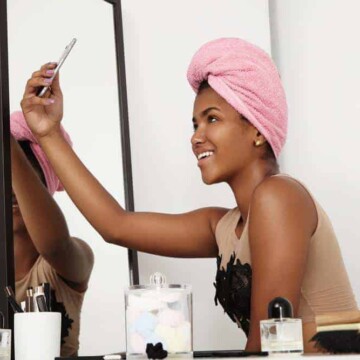
Chlorine, which lurks in pools and even your own home, can completely ruin your hair. It can strip hair of its natural oils, weaken its protein structure, and even leave a green tint on it (i.e., leaving your hair green).
It's also not good for your scalp. So, it's always a good idea to take preventive measures to protect your hair from chlorine exposure.
In this article, we'll help you prevent chlorine-damaged hair. We'll share tips for protecting your hair from chlorine damage and helping your tresses bounce back after chlorine damage.
Table of Contents
How to Protect Hair From Chlorine in Pools
Ready to learn how to give your hair the preventive care it needs before coming in contact with chlorine in the pool? Keep reading for some easy and quick tips to follow before taking a dip:

Condition Before Swimming
Before you go anywhere near the pool, it's crucial that you condition your hair with a high-quality conditioner. Doing so will create a barrier between your hair strands and the harsh chemicals found in swimming pools.
Though we often try to avoid silicones in our conditioners out of fear of buildup, they are actually beneficial in this case.
Silicones act as a physical barrier, keeping the chlorine from penetrating your hair shaft and causing damage. So, opt for a conditioner with silicones and clarify your hair every few weeks to stave off buildup.
Apply an Oil to Your Hair Before Swimming
Before you jump into the pool, coat your hair with a light oil such as jojoba or coconut oil. Doing so will create an additional protective layer between your hair and the chlorine. It will also keep the surface of your hair moisturized so that it'll retain its natural shine and softness.

Wet Your Hair Down Before Swimming
If you'd rather not condition or oil your hair prior to swimming, wetting it down with plain water is a good idea. Why?
Every hair strand has a limit when it comes to how much liquid it can absorb.
So, drenching your hair will ensure that it's unable to absorb as much water from the pool (and, consequently, chlorine).
Use a Swim Cap
If you're serious about protecting your hair from chlorine damage, then wearing a swim cap is essential.
Not only will it keep your hair drier while you're in the pool, but it'll also reduce the risk of chemical buildup on your scalp—something that can cause scalp irritation and other problems if left untreated.

Rinse After Swimming
Once you've finished swimming, it's important that you rinse off any residual chlorine or salt water as soon as possible.
Use cool or lukewarm water (never hot) and rinse until all residue is gone; this should take no more than five minutes or so, depending on how long you spend in the water.
Avoid using shampoo immediately after rinsing as this could strip away oils that protect your scalp and strands from harsh chemicals like chlorine and saltwater.
Instead, opt for a hydrating conditioner afterward to replenish moisture levels lost during swimming sessions.
Protect Your Hair From Chlorine in Your Shower
You may not have been aware of it, but chlorine is also known to be present in tap water at most homes. Although the chlorine levels in home taps are generally much lower than what you'd be exposed to in the average swimming pool, washing your hair in the shower can still lead to hair damage.
Here are some tips for protecting your tresses from chlorine even when you're not taking a dip in a pool:

Install a Water Filter
The best way to avoid chlorine buildup in your hair is by installing a water filter. This will reduce the levels of chlorine in your water and make it safer for your hair and scalp.
All you'll need to do is attach it to your existing shower arm and run the water for a little while to prime the filter. Within a few minutes, your filter will be ready to use.
These water filters are usually super affordable and easy to find online and in person at your local department store. Another option is to buy a whole-house water filter, which will treat all the water in your home.
It's more expensive upfront, and the installation process may be a little more involved, but it can all be worth it if you have a large house with several bathrooms.

Use Bottled or Distilled Water
If you don't want to install a filter and you know that your residential pipes have a lot of chlorine, you can use bottled or distilled water for washing your hair.
This will help reduce the amount of chlorine that penetrates your strands and minimize damage. Just ensure that the bottled water you use is chlorine free.
Deep Condition More Regularly
Chlorine is known to cause hair dryness and breakage, so it's important that you deep condition more often if you're exposed to it on a regular basis. Try using an intensive deep conditioner once a week to replenish lost moisture and keep your hair looking healthy.

How to Get Chlorine Out of Your Hair
Chlorine can have lasting effects on your hair, and they're negative. If you've been swimming a lot, your hair can become stiff, brittle, and dry due to chlorine buildup.
If that happens, it's time to get rid of that residual chlorine and give your hair some TLC. Here's how to get the chlorine out of your hair:
Use a Strong Clarifying Shampoo
It's important to use a clarifying shampoo every once in a while to remove any residue that may have built up on your strands. Use lukewarm water and massage the product into your scalp and hair for several minutes before rinsing it out.
It'll free your strands of lingering chlorine molecules and any other buildup.
Be careful of the shampoo you choose - some clarifying shampoos aren't strong enough to remove chlorine, so make sure to look for a shampoo that has chlorine removal in its product description or on the label.

Do an Apple Cider Vinegar Rinse
Vinegar is an effective way to remove chlorine buildup in your hair. Mix one part vinegar with three parts water, and then use it as a final rinse after shampooing.
Massage the mixture into your scalp and let it sit for several minutes before rinsing it out. This will remove any chlorine molecules and restore the pH balance of your scalp.
Should You Wash Your Hair Daily if You Swim?
On one hand, if you're exposed to chlorine daily, it's important that you rinse off any residual chlorine to protect your hair and scalp from damage. On the other hand, shampooing every day can be too harsh for some people's strands and could leave them feeling dry and brittle.
So, we encourage you to find a balance between the two.
If you swim frequently, try washing your hair every other day and follow up with an intensive conditioner afterward. This way, you can get rid of the chlorine while still providing your hair with enough moisture to stay healthy and strong.
If you're still worried about chlorine buildup in your hair, you should know that there are also special shampoos on the market specifically designed to remove chlorine from hair in a gentle way.
These products, called swimmer's shampoos, contain ingredients that bind to chlorine deposits and help you rinse them away.
Consider adding a swimmer's shampoo to your hair regimen if you want to minimize the amount of chlorine that sits on your hair at any given time.
Note: Don't underestimate the importance of deep conditioning after every shampoo!
- Do Swim Caps Keep Hair Dry?
- Can You Get Box Braids Wet?
- Can You Swim After Dying Your Hair?
- Can I Swim With Box Braids?
Chlorine can do serious damage to your hair if you're not careful. Thankfully, with the information presented in this article, you've got all you need to protect your hair from the chemical. We hope you found this article helpful, and we wish you the best with your hair.




